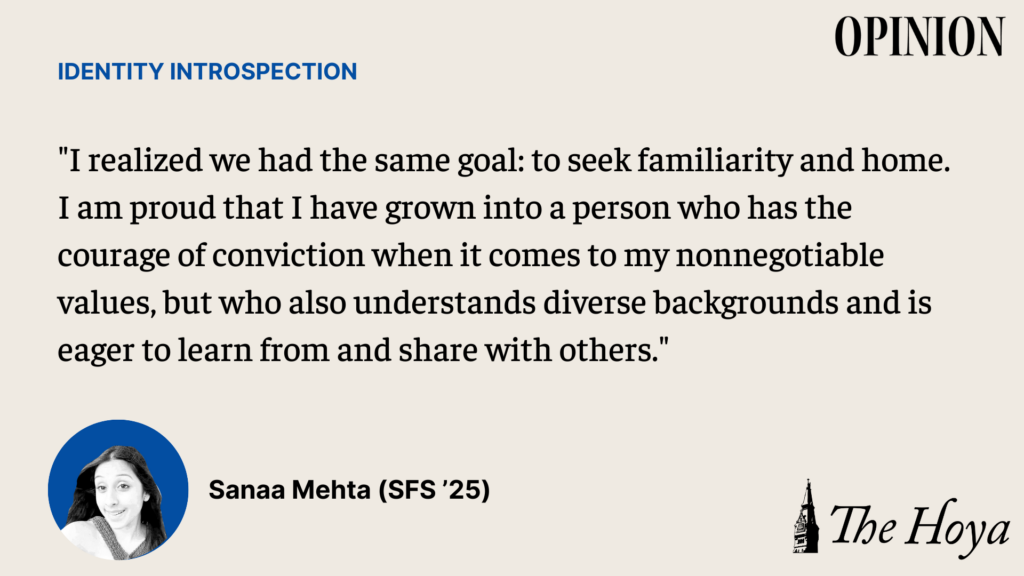I was born in New York City, but I moved to Mumbai at the age of 6. I went to the American School of Bombay, but I lived in a joint Gujarati family of eight people for eight years. I have a U.S. passport, but I am a Mumbai resident. I had a strong American accent when I moved to India and got rejected from three elementary schools because I did not speak fluent Hindi. Now, my relatives and friends from Mumbai tell me I am my funniest self in Hindi and Gujarati. From my accent to the way I interact with the South Asian community at Georgetown, culture clash has been a key part of my identity here.
I frequently switch my accent, and I have done so since I could speak. At home, I always speak English in an Indian accent, even though English is one of my first languages. “Hing-lish” is a common way of communicating in my family.
At school, my accent is different. It is natural and subconscious; I don’t do it to fit in or to conform at Georgetown, or in Mumbai. My cousins always tell me I am “whitewashed” when they overhear me talking on the phone with my American friends. At school, when calling my parents, I always get surprised looks when I sound Indian. It is not only my accent that is subject to scrutiny — from my relatives in particular, I always get a tinge of judgment about my aspirations to work and live back in the U.S., because they take it as a betrayal of my roots.
While I have found a “home” over the year and a half I have spent here at Georgetown, my identity confusion definitely still exists and interferes with my day-to-day thoughts and interactions. If I could go back in time, I would have thrown myself at opportunities to take my convictions with me instead of blending in with what I thought was expected of me because of my Indian upbringing.
Don’t get me wrong — being a global citizen is exhilarating. I seek home in everything I do, everyone I meet and everywhere I go. I’ve immersed myself in Rangila, a philanthropic South Asian performing showcase, and I’ve found friends on my floor who respect my complicated third-culture-kid identity without making comments like “your accent is so American” — yes, I am hyper-aware of my accent switches!
Seeking “home” in everything, though, is not always a good coping mechanism. Expectations of belonging often come with disappointment, making it feel like I’m fitting a square peg into a round hole when I try to make aspects of Georgetown my “home” when it may not have the right substitutes.
Coming to Georgetown, I was scared of the South Asian cultural clubs because they were run by students who have grown up in the United States. Suddenly, I felt inferior, as if being Indian was a quantifiable trait. I was worried that many wanted me for my background and not for who I really am. At the same time, I felt inadequate about fulfilling expectations. Unlike many girls here, I was not trained in any classical Indian dance or instrument. I do not know how to roll a roti, let alone cook lentils or vegetables. My Hindi and Gujarati grammar is extremely colloquial and not polished by any means. The sentiment of feeling left out and not finding my place is daunting.
A lot of people assume the reason that students of diverse ethnicities avoid their own is because it is easier to conform to a predominantly white culture and narrative than it is to stand out and have to explain one’s background and traditions to those who are unfamiliar. I can’t speak to that, though, because I am more than happy to go into a deep-dive on what my upbringing was like and what values I have as a South Asian, Indian, Mumbaikar student.
The reason I avoided engaging with Georgetown’s South Asian community was extreme introspection and an increasing apprehension. I did not want to be told what it was to be “South Asian” or Indian and become disillusioned with my own definition of it.
Participating in open, malleable communities conquered that fear. I forced myself to speak to the president of the South Asian Society to hear more about the community of South Asian students on campus. I found my niche as philanthropy chair of the South Asian Society for Rangila. The second I stepped on stage to emcee Rangila 27 — amid the vibrant dances and music that reminded me of home and familial sentiment around me — I fell in love with the whirlwind that is Rangila. I was still scared, but it didn’t matter because it felt like home. I am grateful to have met people who define being South Asian in so many diverse, open-minded ways.
I realized we had the same goal: to seek familiarity and home. I am proud that I have grown into a person who has the courage of conviction when it comes to my non-negotiable values, but who also understands diverse backgrounds and is eager to learn from and share with others.
While code-switching is normal, it does not diminish my excitement in sharing tradition. South Asian students like me are making our mark here at Georgetown, and non-South Asian students are learning about our roots, traditions and values. To incoming international first-years, a word of wisdom: do not shy away from experiences and do not fall into false assumptions about clubs, people, or opportunities. If you cannot see your place in a club or group here at Georgetown, I assure you that you can find it or create it.
Sanaa Mehta is a sophomore in the School of Foreign Service. Identity Introspection is published every third Friday.















Punit • Feb 25, 2023 at 10:58 pm
Wonderful Article!
Sneha Mehta • Feb 24, 2023 at 6:42 pm
Amazing read!